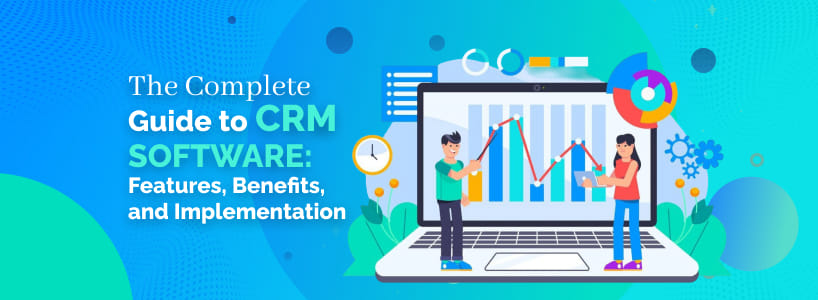The Complete Guide to CRM Software: Features, Benefits, and Implementation

In todays competitive digital marketplace, businesses are increasingly turning to CRM software to streamline operations, improve customer relationships, and drive sales. But what exactly is CRM software, and how can it transform your business?
What is CRM Software?
CRM (Customer Relationship Management) software is a tool that helps companies manage their interactions with current and potential customers. It stores essential customer data, automates marketing and sales processes, and improves communication across departments. Whether you're a small startup or a large enterprise, implementing the right CRM can significantly enhance productivity and customer satisfaction.
Key Features of CRM Software
Modern CRM software for small business and large enterprises comes with a range of robust features, including:
- Contact Management: Centralized storage of customer data, including names, emails, call history, and preferences.
- Sales Pipeline Tracking: Easily monitor leads and opportunities across various stages.
- Email and Marketing Automation: Schedule campaigns, track email opens, and nurture leads efficiently.
- Customer Support Tools: Integrated ticketing systems, live chat, and helpdesk features for better service.
- Analytics and Reporting: Custom dashboards that offer real-time insights into customer behavior and sales performance.
Major Benefits of CRM Software
Implementing a CRM system brings a host of advantages:
- Improved Customer Relationships: By having detailed customer profiles, your team can personalize interactions and build loyalty.
- Increased Efficiency: Automating routine tasks reduces manual work, freeing your team to focus on core activities.
- Data-Driven Decision-Making: With advanced reporting tools, you can track KPIs and adjust strategies quickly.
- Better Collaboration: Teams across sales, marketing, and support stay connected through a unified platform.
How to Implement CRM Software
Successful CRM implementation involves a few key steps:
- Define Your Goals: What challenges are you trying to solvelead management, customer retention, or sales tracking?
- Choose the Right CRM: Look for a platform that fits your business size and industry. Cloud-based CRMs are ideal for flexibility and scalability.
- Train Your Team: Adoption is critical. Ensure your staff understands how to use the software to its full potential.
- Integrate with Existing Tools: Ensure your CRM connects with your email, website, and accounting tools.
- Monitor and Optimize: Regularly evaluate the systems performance and make updates based on feedback.
Choosing the Right CRM Partner
When selecting CRM software, it's not just about featuresits about service and support. Work with a trusted provider who understands your needs and offers dedicated assistance.
If youre searching for affordable CRM software solutions with advanced features and excellent support, reach out to us at crm@weblink. Our experts will help you find the best-fit CRM tailored to your business needs.
Conclusion
CRM software is no longer a luxuryits a necessity for businesses looking to stay ahead. By understanding its features, recognizing the benefits, and planning a strategic implementation, you can unlock its full potential and create lasting customer relationships.
-
26 July, 2025 at 12:07 amYour perspective on this is truly creative and unique. It’s refreshing to see this angle!
-
25 July, 2025 at 10:24 pmThis is a well-structured and informative guide on CRM software! I appreciate how the blog breaks down not just the features, but also the implementation strategy and business benefits. Very helpful for companies looking to streamline customer relationships and boost productivity.
Add a Comment
Your email address will not be published. Required fields are marked *
Categories
Popular Posts
![Customer, Lead, or Deal? Understanding CRM Sections for Smarter Sales [thumb]](https://blogimages.weblink.in/customer-lead-or-deal-understanding-crm-sections-for-smarter-sales-350x128.jpg)
Customer, Lead, or Deal? Understanding CRM Sections for Smarter Sales
![How EduAutomate Brings Real-Time Visibility to All Admin Operations? [thumb]](https://blogimages.weblink.in/how-eduautomate-brings-real-time-visibility-to-all-admin-operations-350x128.jpg)
How EduAutomate Brings Real-Time Visibility to All Admin Operations?
![How CRM Vendor Management Enhances Your Procurement Process [thumb]](https://blogimages.weblink.in/how-crm-vendor-management-enhances-your-procurement-process-350x128.jpg)